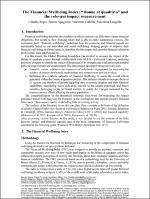Chapter The Financial Wellbeing Index: “Donne al quadrato” and the relevant impact measurement
Author(s)
Segre, Claudia
Spagnolo, Serena
Gabella, Valentina
Langella, Valentina
Language
EnglishAbstract
How can we reduce economic violence? Can financial literacy and education enhance economic wellbeing? The present paper reports the results of a research conducted by ALTIS – Università Cattolica and Global Thinking Foundation for the evaluation of changes, improvements and consequences produced by the educational course in financial literacy ‘Donne al quadrato’, provided by the Foundation among the policies against economic violence implementation. In this study, impacts’ measurement refers to conceptual framework of financial wellbeing, a composite notion constructed of objective and subjective dimensions related to people’s financial behaviour. The expression ‘Financial Wellbeing’ highlights how economic issues are inextricably bound to individual and social wellness. Helping people enhancing their own financial wellbeing – in a broad sense – should then be the very first purpose of economic education activity. In the present research, financial wellbeing has been measured by the implementation of a synthetic index, based on studies of World Bank and University of Bristol. The index is intended to measure people’s self-sufficiency and independence about their financial situation, resources and capabilities. The indicator takes into account both micro and macro features, being the first ones specific of the sample analysed and latter territorial context variables employed for the removal of the macroeconomic changes affecting the entire population from the specific changes proceeding from the training. The trial, involving different Italian regions, has been fulfilled by the administration of a tailoredmade survey pre and post the “Donne al Quadrato” course, during academic year 2019/2020, in order to register the change occurred in the respondents’ perception of their knowledge, behaviour, personality and aptitudes. The results of the experimentation demonstrated that financial education could engender the modification not only of knowledge but also of awareness and proficiency in financial behaviours, as well as the increase of course participants’ financial wellbeing.


 Download
Download Web Shop
Web Shop